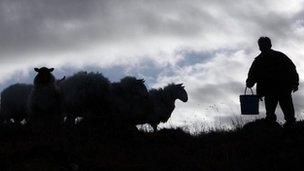Scottish farmers 'optimistic about future'
- Published

Poor lamb prices made the past year particularly difficult for hill farmers
Scottish farmers remain optimistic about the industry's future despite two years of wet weather-hit harvests and rising costs, according to a report.
The annual Bank of Scotland Agricultural Report found farmers who believe the industry to be prosperous or very prosperous fell to 11%.
This was eight percentage points lower than 2011.
But the report said many farmers were expecting a period of growth over the next five years.
The survey found the decrease in prosperity was reported in all sectors, with hill farmers showing the largest down-turn, largely because of poor lamb prices seen over the past 12 months.
But despite the perceived dip in current prosperity, confidence in the long term future of Scotland's agriculture sector remained high, with optimism levels at their second-highest since the survey began.
Strategic view
More than a quarter - some 28% - of farmers said they were optimistic or very optimistic about the industry, with expansion planned across most sectors.
Growing global population and rising demand for food meant that, with the exception of lamb, Scottish farmers were predicting prices for all produce will rise over the next year.
The report's authors also said that, despite difficult current conditions, farmers are still maintaining a long-term, strategic view by investing in their enterprises.
Investment across Scotland's farms in 2012 was higher than predicted at the start of the year. 45% invested in plant and equipment, after only 28% stated last year that they planned to do so.
Some 85% of Scotland's farmers said they were profitable over the last complete financial year - down two percentage points on the previous year, while 59% of those who answered said they expected their businesses to be profitable in 2013.
Dairy farm incomes were particularly under pressure, with the survey finding less than half of dairy producers (48%) anticipated their business to be profitable, down from 80% in 2012.
However, plans for dairy expansion were particularly strong, with 32% saying they intended to increase their operations. While the industry is seeing the number of dairy farms contract, the number of animals per herd is increasing, indicating a concentration of the industry as fewer, larger units develop.
Donald MacRae, chief economist at Bank of Scotland, said: "Last year's weather ensured the recession affecting the most of Scotland's economy for the last five years finally caught up with farming.
"Relatively unscathed until then, the agricultural industry is now coping with rising input costs, depressed lamb prices as a result of falling lamb exports to southern Europe and poor yields of potatoes and cereals.
"Despite the economic climate, agriculture remains an attractive and relatively secure sector for investors thanks to valuable farm assets, positive prices for produce and high levels of support in terms of subsidies.
"Bad weather might be challenging for farmers in growing crops and tending animals but it does reinforce the world's increasing demand for food. As a result the long term prospects for Scotland's oldest industry must surely remain bright."
The Bank of Scotland's Agriculture Survey is the largest survey of Scottish farmers, taking into account the responses of 474 farmers from a randomly-selected sample of 2073 full-time producers.
Carried out by post between 1 December 2012 and 4 January 2013, the survey results represent all major farm types, from a geographical distribution across the whole of Scotland.
- Published22 November 2012
- Published10 October 2012
- Published25 September 2012